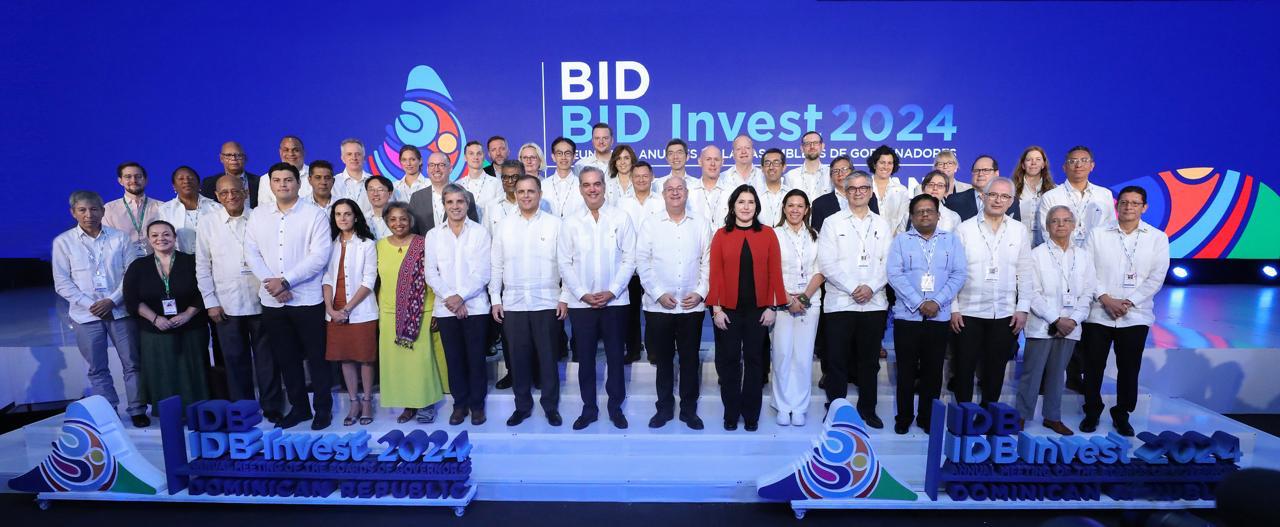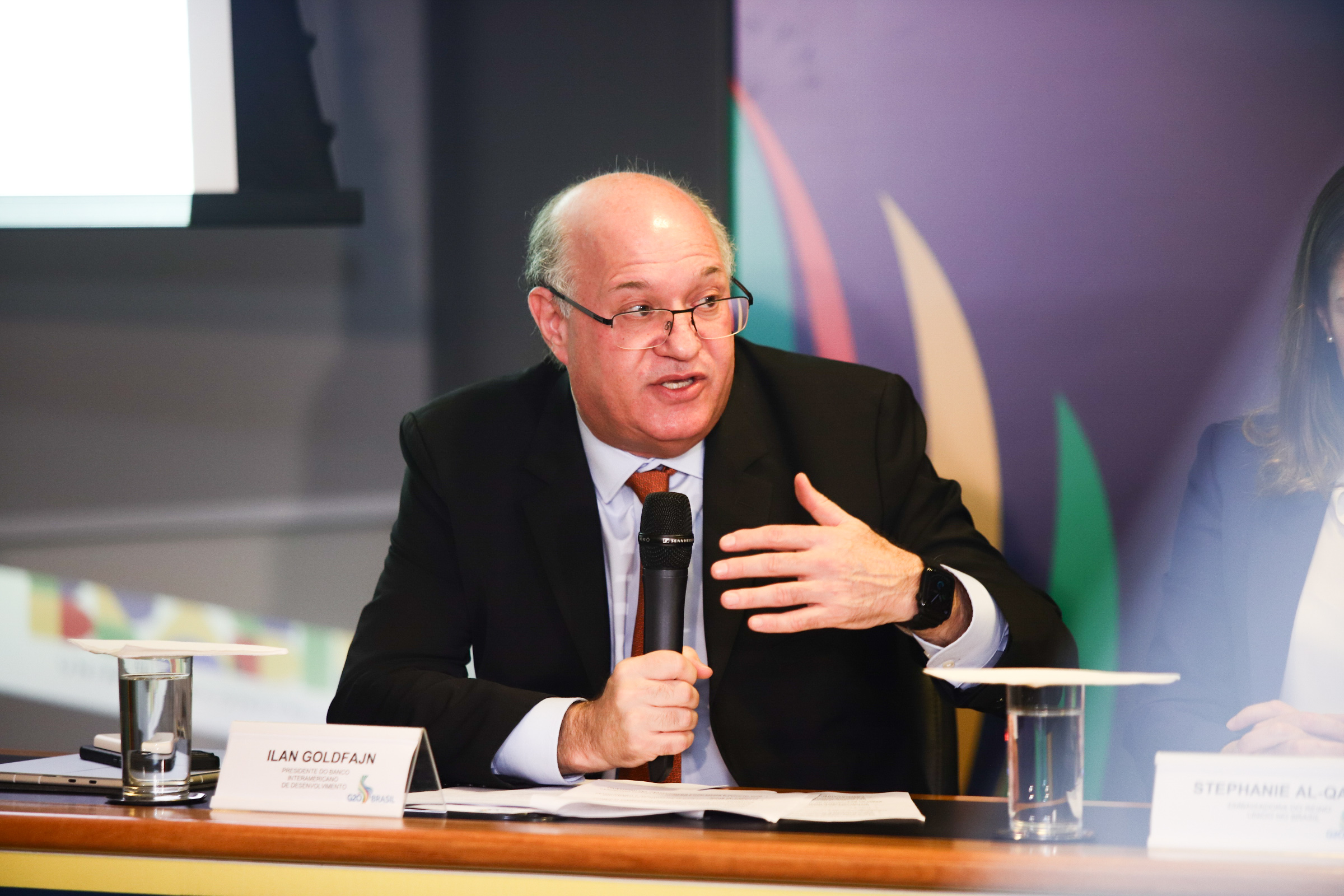"Merely lending money is not sufficient. It is imperative to assess the impact of projects on people’s lives," emphasizes the President of the Inter-American Development Bank (IDB)
In an exclusive interview with the G20 Brasil website, Ilan Goldfajn, the President of the Inter-American Development Bank (IDB), elucidated the specific measures undertaken by the institution to execute the reform of governance within development banks, a priority of the Brazilian presidency in the G20. Goldfajn emphasized the crucial task of accurately assessing the tangible impacts of loans on individuals' lives, and stressed the imperative of addressing climate change. He further articulated that "the mandate we aim to pursue within the IDB and the MDBs¹, in alignment with Brasil's presidency of the G20, is one characterized by consensus-building, bridging divides, and seeking common ground to facilitate progress."

A paramount objective of the Brazilian presidency within the G20 is the reform of global governance institutions, which notably involves close collaboration with multilateral development banks. This agenda underscores the imperative for financial institutions to enhance their efficacy in addressing the significant social and environmental challenges confronting the world today.
Under the leadership of Brazilian economist Ilan Goldfajn since 2022, the Inter-American Development Bank (IDB) has emerged as a leading force among multilateral and regional development banks (MDBs and RDBs², respectively), offering a distinctive platform for shaping the agenda of Global South countries in pivotal decision-making forums.
The group of MDBs and RDBs comprises 12 financial institutions spanning all continents. Together, they provide an annual lending volume of roughly BRL 1 trillion (equivalent to about US$225 billion) for infrastructure initiatives, social development programs, and energy transitions.
While increasing funding is paramount, the current discourse centers on optimizing the loan approval procedure, particularly for low-income countries, to ensure the expeditious allocation of funds to grassroots projects and precise evaluation of their tangible impact on people’s lives.
Ilan welcomed the G20 Brasil website to his residence in São Paulo for an exclusive interview, during which he delved into various topics concerning the development agenda of Global South countries, including energy transitions and poverty reduction. Explore the breadth of topics covered in the interview.

Bigger, better, and more efficient banks
The foremost priority lies in enhancing the scope and effectiveness of projects. What does this entail? Essentially, it underscores the necessity for substantially increased funding to tackle contemporary challenges, encompassing both climate-related and social issues, aiming to bring about tangible change. However, the mere allocation of additional funds is insufficient. It becomes futile if they do not reach their intended destination. Similarly, if the funds reach their target but in insufficient amounts, their impact remains negligible.
Multilateral banks must expand their size, indicating the necessity for increased funding. They should enhance their efficiency, ensuring they reach grassroots levels effectively. Additionally, they must adopt more ambitious goals and timelines. Should the objective be the reduction of carbon emissions, prompt action is warranted rather than delay? Similarly, the resolution of poverty and inequality should not be deferred until 2050.
Implementing reforms in global governance
The guiding principle of Brasil's presidency within the G20 is to foster larger, more robust, and increasingly ambitious multilateral banking institutions. It is incumbent upon us to articulate the specific implications of this directive. During a gathering with fellow presidents of multilateral banks, we deliberated on strategies for progression and reached consensus on actionable measures. This included delineating our engagement with G20 working groups, notably the International Financial Architecture Working Group. This group will undertake the development of what is termed the G20 RoadMap, a comprehensive work plan charting the course for multilateral banks in the years ahead.
We must undertake a reform focused on project impact. Primarily, we need to catalyze a paradigm shift, transcending mere consideration of available resources to encompass the entire project lifecycle. Do we concur with this proposition? Furthermore, what are the subsequent procedural steps to be implemented? Financial institutions often prioritize monetary metrics while disregarding the human ramifications. For instance, when confronted with statements such as, 'This year, we provided loans totaling $13 billion, surpassing last year's figures...' This is understandable, however, the crux lies in quantifying enhancements in sanitation, access to drinking water, poverty alleviation, and the reduction of inequality stemming from these investments. Did the recipient countries undergo necessary tax reforms? Have we effectively mitigated reliance on fossil fuels? These pragmatic considerations should guide our focus moving forward.
In reality, this comprises a series of measures: assessing effectiveness, evaluating impact, scrutinizing results, and securing additional funding. Additionally, we must collaborate with credit rating agencies as they influence our ratings. While we aim to assume more risks and extend aid to additional countries, we endeavor to avoid punitive repercussions. With a substantial agenda before us, the primary challenge lies in effective prioritization.
Strategies for change
I assert that a demonstration of our efforts was ratified during our annual meetings held in Punta Cana, Dominican Republic, in early March. Marking a historic moment in our institution's 65-year legacy, our Board of Governors simultaneously approved three transformative changes, propelling the IDB Group to become a bigger, better, and more agile institution.
The 48 member countries of the IDB have endorsed the new Institutional Strategy of the Development Bank, prioritizing impactful endeavors. Additionally, they have approved a $3.5 billion capital increase for IDB Invest—the Group’s financing arm for private enterprises—and a $400 million increase for IDB Lab, the Group's innovation and venture capital arm.
These changes will significantly enhance our capacity to assist Latin America and the Caribbean in confronting their challenges and realizing their potential, aiming to catalyze a pivotal moment in development. Our overarching goal is to enhance lives through increased scale and impact.

Enhancing project implementation capacity
Another prevalent issue is the frequent lack of capacity among countries to effectively utilize allocated resources. Simply creating a well-conceived project isn't adequate. Often, the public sector's ability to execute these projects is insufficient or limited. Brasil stands out for its comparatively superior capacity to accomplish tasks compared to other Latin American countries. It's imperative to allocate efforts, resources, and funds toward capacity-building initiatives to enable individuals to execute projects successfully. Overcoming this capacity barrier necessitates transitioning from being solely a resource provider to becoming a knowledge repository as well.
Combating climate change
In the context of a country grappling with substantial debt, our objective is to provide assistance. One approach is to swap this burdensome and precarious debt for a new debt with reduced costs, thereby freeing up funds for targeted purposes, such as addressing climate-related challenges. As an illustration, we recently funded a project in Galápagos, Ecuador, which aligns closely with this objective.
The worldwide imperative to mitigate emissions is undeniable. While numerous mitigation projects are underway to decrease emissions, there is an equal need for adaptation projects. What exactly do we mean by adaptation? In South America, the impacts of climate change are palpable; from record-breaking temperatures to water shortages, wildfires, and hurricanes, the effects are undeniable. There is a pressing need for established protocols on how to aid countries grappling with natural disasters, as well as support for countries burdened with heavy debts, especially during such crises.
Merely expressing a desire to provide financial assistance to combat deforestation is inadequate; we must instead invest in diverse opportunities, including the bioeconomy and robust infrastructure, along with addressing fundamental needs like sanitation. Our approach encompasses a holistic perspective with multiple pillars, resonating strongly with stakeholders.
Brasil leading the G20 and the MDBs
When discussing global governance change, it entails a shift in perspective aimed at fostering inclusivity and collaboration. Our mandate at the IDB and the MDBs, aligned with Brasil's presidency of the G20, is centered on consensus-building, bridging divides, and seeking common ground to advance collectively.
Obstacles to consensus
There is a facet of the situation that doesn't pertain to me, neither from an ideological nor geopolitical standpoint. During the Finance Ministers' meeting, a report was presented by the Brazilian presidency, yet there was no official communiqué issued. This wasn't due to a lack of consensus on the actions of the banks; indeed, there is alignment among countries regarding initiatives to combat inequalities and establish international taxation protocols. However, consensus on geopolitical matters was not reached.
The key message conveyed here is the importance of approaching our work with pragmatism, placing emphasis on the welfare of individuals within each country, especially those most vulnerable, and collaboratively striving to meet their needs. Our primary emphasis should be on fostering consensus through pragmatic methods. Let us refrain from pursuing impractical or fantastical solutions.